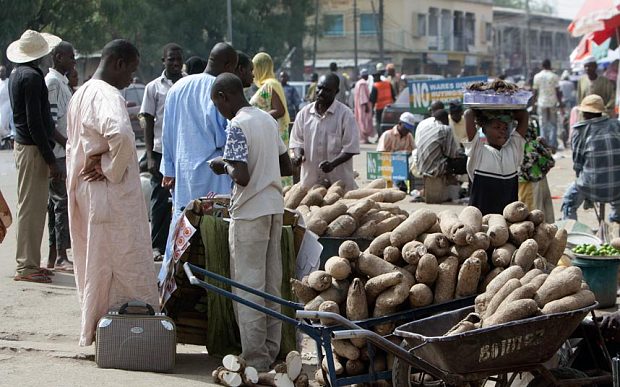
By GBENGA AKINGBULE And DREW HINSHAW
Business is bustling at one of the most frequently bombed shopping centers on Earth.
Monday Market has been hit at least four times in the past 12 months, officials say, leaving scores dead. Even security guards, herding customers through metal detectors at the market’s gate, struggle to remember how many times they have seen a suicide bomber sprint past them. Many of the attackers were young girls, they say.
Here in a nation plagued by terrorism—in the city that has borne the brunt of the militant group Boko Haram’s six-year-long jihad—this outdoor commercial plaza is the place that has been struck the most.
On a particular Thursday, soldiers swept Monday Market on intelligence reports that 20 bombs had been placed across the city. If that is true, bomb squads haven’t found them. The day before, three blasts in two markets in neighboring cities killed 46 people.
More news of violence in the wider region came Friday November 20, as soldiers in Mali’s capital shot their way into a hotel, liberating dozens of hostages after a siege by gunmen that officials said killed 27 people.
Despite the ceaseless attacks in Maiduguri, resolute shoppers are pouring back into their market, driving hard bargains and helping to resuscitate one of the world’s most moribund local economies. Encouraged by volunteers checking bags and burqas—and forced by necessity—they come to buy fresh fruit, cell phones and a host of other goods.
Their return signals how people here are powering ahead with their lives in defiance of Boko Haram’s threat.
“I want to make a vegetable soup,” said Blessing Tunu, a 35-year-old who said she wasn’t going to let Boko Haram prevent her from accomplishing that aim. “I’m scared. But what can you do?”
Juliet Emmanuel, a shopper picking up some baby food for the infant son tied to her back, also struck a note of resistance. “Boko Haram terrorists cannot stop me from coming to the market,” she said.
While most of the world has been focused this week on Paris—where Islamic State demonstrated its capacity to indiscriminately kill civilians—ordinary Nigerians have been showing off their own ability to persevere.
Some 27,000 have been killed in Nigeria’s war with Boko Haram. Last year, the group killed 6,664, according to the Global Terrorism Index, making it even more lethal than Islamic State, to which Boko Haram has pledged allegiance.
In retaliation, Nigeria’s army has chased Boko Haram more aggressively than ever, pulling troops from three other nations to help scour the mountains and scrubland where Boko Haram camps. President Muhammadu Buhari has given his army until the end of the year to “eradicate” the group.
For its part, Boko Haram has responded by killing even more civilians. This year, it has destroyed at least 1,000 schools, the United Nations says. More than 4,000 people have died.
As the fight continues, an equally important campaign has been under way to carve out some normalcy for the 12 million people still living in the region. Local authorities have placed metal-detector stations around town, set up roadblocks, created watch lists—and come to terms with the frailty of life here.
“I’m tired of the bombs, so I’m not scared,” said Esther John, a 18-year-old coming to buy make-up. “I leave my life to God. I just have to come to the market.”
At stake is whether northeastern Nigeria’s economic and cultural activity can recover, providing a bulwark against the recruitment efforts of Boko Haram. It has a long way to go.
For years, Boko Haram has terrorized Maiduguri in a way that few other cities could comprehend. A half decade of bomb blasts and gun battles have killed thousands of this city’s residents—including a generation of Muslim scholars who disagreed with the group.
Curfews, helicopter patrols, trunk searches, bomb-squad operations, checkpoints and lockdowns are routine here. More than 2.5 million people have left the surrounding area—four times the number who have crossed the Mediterranean into Europe this year. In that chaos, Monday Market has been particularly hard hit.
In his 10 years of selling car batteries, Ebukka Ejafor has witnessed 18 terrorist attacks here. For years, he barely scraped by. Now, he is expanding his inventory: “This year, there is a little boom in the business,” he said.
Much of that is thanks to the 100 or so volunteers who take turns checking bags, cars, and clothes at the gate.
About a year ago, Mohammad Abdullahi, a high-school student, volunteered to help check bags at the market every day after school. In March, a woman ran into the market. Mr. Abdullahi and 29 other people died in that routine blast. Now his older brother works his shift.
“We are not going to back down,” said the brother, Ibrahim Abdullahi. “We are ready to die protecting our market.”
—Emmanuel Julius contributed to this article.
Wall Street Journal
